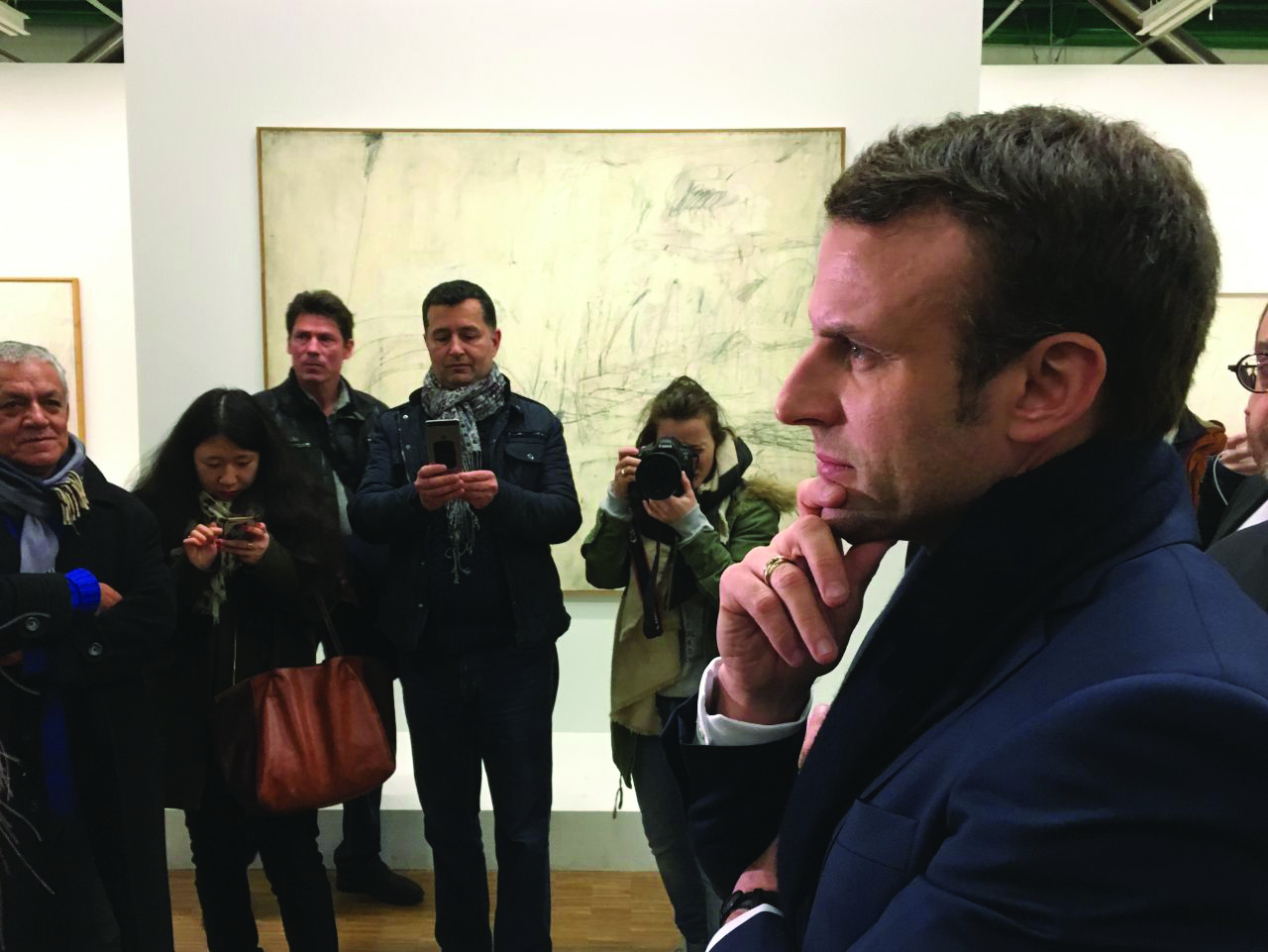Testament of Youth
by Siddhartha Mitter

Emmanuel Macron takes in the Cy Twombly exhibition at the Centre George Pompidou, Paris. 2017. Photo: Pauline Théveniaud.
Had he not set out on the path, through finance and government, that would lead him to become president of France, Emmanuel Macron might have become an author or stage actor. So he told the moderators of the last television debate before the first round of the election, in which he would place first, with 24%, nearly three points ahead of the longtime frontrunner Marine Le Pen. Macron’s rapid political rise has involved some strategically vague language, the better to rake in support across France’s fractured political spectrum, but on this matter of aspirations, he seems sincere. Macron is a cultured person, where culture is understood, in the French way, as cultivation — a strong grounding in the literary and philosophical canon, and its deft deployment from the workplace to dinner parties.
His paeans to French identity begin with French itself: how it formed from regional dialects; its poesy and reach; its variants overseas. His own French is quite academic — the 39-year-old was a secretary for the philosopher Paul Ricœur before going into banking — and he gets teased, though with an undercurrent of admiration, for trawling out ten-euro-words and old-style exclamations like de grâce! and la belle affaire! (Not that Le Pen or any other candidate spoke “bad” French; even odious politicians here tend to have good grammar.) But when, during a campaign rally in Lyon this February, he pointed out how much French arts owe to foreign-born creators, Macron opined that il n’y a pas une culture française: “there is not a French culture,” that is, not a single one. The language guy had messed up, and his rivals on the right pounced on the sentence’s exploitable nuance: He doesn’t believe in French culture! He’s an English-speaking ultraliberal, a Muslim-loving globalist! Macron’s retort was clumsy: there isn’t “a French culture,” he tried to clarify, but rather “a culture in France, and it’s diverse.” Later that month, while campaigning in (of all places) London, he cited Picasso and Chagall as proof that “I’ve never seen such a thing as French art,” and zinged his opponents as “people who forgot how to read.”
To understand why Le Pen and her cohort charged so hard against “a culture in France,” it helps to look at another sensitive topic that forced Macron into a similar backpedal that same month. In an interview in Algeria, he called French colonial occupation a “crime against humanity” — a rash statement, perhaps, in terms of international law, but one with the merit of emotional clarity. The hubbub that followed led him to rephrase his assessment as “a crime against the human” (whatever that meant), but the right smelled blood again; François Fillon, for one, called it “disgraceful” and an act of “hatred of our history.” Though neither the Algeria bust-up nor the culture ruckus ultimately derailed Macron’s ascent, the two incidents are linked. Culture in France is a policy area, with a ministry that will dole out €7.6 billion this year, but it is also a symbolic resource that, by general agreement, is part of the wealth and worth of French society. Its relationship to history is selective: since culture tends to be the beautiful things, it occludes the unpleasant bits. Broadening the accepted idea of French culture to include, on anything close to an equal basis, France’s large, diverse, and multigenerational Muslim and African communities, risks engaging colonial history and the continuing facts of discrimination and inequality at deeper than a sanitized level. As Macron’s timid foray showed, it can get awkward.
What kind of cultural president will Macron be? François Mitterrand, another president with a fine literary mind and slippery political instincts, built monuments: the Bastille Opera, the pyramid of the Louvre, and the national library that now bears his name. Jacques Chirac built the Musée du Quai Branly; Valéry Giscard d’Estaing initiated the project of the Musée d’Orsay; Georges Pompidou’s legacy towers over Beaubourg. (One notes that these are all in Paris.) Since 2007, however, Nicolas Sarkozy and François Hollande have left little cultural legacy, and Macron’s proposed cultural policies, too, appear small-bore and, in keeping with his overall approach to government, technocratic. He wants public museums’ boards to have more decision-making autonomy. He has ideas for improving public broadcasting. His freshest proposal is to give every young person a “Culture Pass” worth €500 a year, to spend on museum, concert, cinema admissions and the like, debited via smartphone application. He thinks it could go Europe-wide.
But beyond spending, culture is a matter of national reckoning — and French culture, though not monolithic and hardly static, still skulks from engaging with past ills and present inequities in the way that American novelists or artists frequently do. Will that change in a macroniste France? It’s hard to say. The new president, who repudiates both right and left (while embracing both market and state), is trying a similar device with cultural identity. If there is no single French culture, he argues, then multiculturalisme, with what he sees as its self-segregating enclaves and behaviors, is just as objectionable. Macron favors “diversity” instead, but in service to a still higher value. “The foundation of French culture,” his party platform unabashedly states, “is to aspire to the universal.”
In Macron’s program, at least as expressed so far, universality is part process, made of museum ticket voucher apps and smaller class sizes for schools in “difficult zones,” and part some kind of transcendental ecstasy that follows from exposure to a somewhat updated literary and philosophical canon. In culture, as in other areas, early signs of the Macron presidency point to an infusion of pragmatism with beatific belief. The method is consistent with the character. Less clear is how much it stands to change the country.